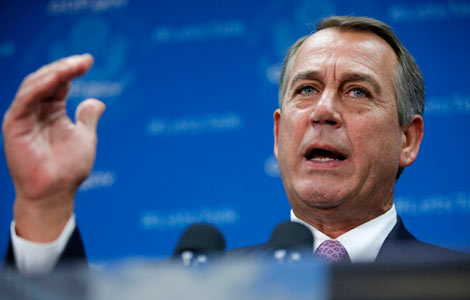Tax debate takes on new sense of urgency
Updated: 2013-10-08 07:31
By Zheng Yangpeng (China Daily)
|
||||||||
Housing prices are on the boil again, heating up the debate on a property tax.
Both Finance Minister Lou Jiwei and Xu Shaoshi, the head of the National Development and Reform Commission, have confirmed recently that more cities will follow Shanghai and Chongqing as pilot cities for the property tax.
However, be it Hangzhou or Shenzhen, both prime candidates for the trial plan, the tax would only cover housing units bought after the program started, Chinese media have reported.
Many wonder what the real purpose of the proposed tax is - a genuine attempt to rein in skyrocketing prices or just another source of government revenue?
Some experts think there's no point to the tax at all, as the real problem in the housing market isn't prices per se but the polarization of ownership.
The rich own scores or even hundreds of apartments in Beijing and Shanghai, while working-class households can barely afford one.
Experts fear that in anticipation of the tax, people would rush to grab a house before the deadline, pushing up prices again.
"In developed countries, the common practice is to impose a property tax on all houses," said Chen Aipin, director of the Shenzhen Property Management Institute.
In developed countries, analysts added, the main purpose of a property tax isn't curbing prices but alleviating income inequality.
If reducing income disparities is the main goal of a property tax, then taxing all properties would be the natural choice. In any case, trials in Shanghai and Chongqing have already proven to be failures in curbing prices.
Some analysts noted that even taxing all property would have a very limited effect on prices, as shown by experience in developed countries.
The rare exception would be in third- and fourth-tier cities, where supply already exceeds demand. There, a property tax would further depress the market.
But structuring the policy that way would betray the original hope of taming extreme price hikes in first-tier cities. Using property taxes to tame home prices, as a traditional Chinese proverb goes, would be "climbing the tree to catch a fish".
Liu Weimin, a real estate researcher in the Development Research Center of the State Council, the nation's top think tank, said the foremost purpose of establishing a property tax system is to build a solid base for local governments' fiscal revenue.
There are currently great disparities between local governments' spending responsibilities and their fiscal ammunition.
Unlike in developed countries where local governments rely heavily on property tax as a revenue source, China's local governments rely on land sales for revenue.
That system has fermented a widespread sense of social injustice, and it also creates a conflict of interest whenever the central government orders measures to tame home prices. A repressed housing market would certainly cool land prices.
Narrowing the wealth gap is another purpose of implementing a property tax, but it only could be effective by taxing all houses. This would discourage wealthy people from hoarding empty homes and make more units available for rental.
However, analysts cautioned that policymakers should be very careful when setting exemptions from property taxes and establishing rate levels, to avoid hurting the middle class and arousing public hostility.
Reasonable exemptions should be provided so that ordinary middle-class households would not be taxed.
If the tax is collected on a market-price basis, it has to ensure that urban dwellers who only own one house don't pay too much tax, even if their unit's market value is very high.
Experts said if the government is sincere about curbing home prices, many steps could be taken instead of just rushing to impose a property tax.
"The way to contain home prices is simple: target fundamentals in supply and demand," said He Tian, head of research at the China Index Academy. "Two ways have proven to be really effective in curbing prices: land supply and credit policy."
Mortgage policies have proved to be quite effective. Demand can be properly reflected when first-time homebuyers get a discounted mortgage rate while second and third house purchases are subject to a much higher down payment and mortgage rate.
In terms of land supply, economists and real estate developers have for years urged the government to scale up supply, with little effect. The central government has also ordered local governments to increase land supply, but that rarely happens.
In 2012, of all the land supply approved by the government, only 24.8 percent was allocated to residential development while 41 percent went to industrial uses.
The inconvenient truth behind this is that offering massive amounts of cheap land to industrial companies, which amounts to a subsidy, can boost local GDP and fiscal revenue.
So it comes down to the taxation issue, again. Unless local governments can develop a fiscal system that is detached from land sale, it's hard to foresee a real stabilization of urban housing prices.
zhengyangpeng@chinadaily.com.cn
(China Daily USA 10/08/2013 page13)

 Firming friendships
Firming friendships
 A smog-filled Beijing targets polluting cars
A smog-filled Beijing targets polluting cars
 Animal welfare to be added in training
Animal welfare to be added in training
 Chasing the dragons
Chasing the dragons
 Boehner: US on path to default if Obama won't negotiate
Boehner: US on path to default if Obama won't negotiate
 New couples take wedding photos during holiday
New couples take wedding photos during holiday
 Williams beats Jankovic to win second China Open title
Williams beats Jankovic to win second China Open title
 Red alerts as Fitow closes in
Red alerts as Fitow closes in
Most Viewed
Editor's Picks

|

|

|

|

|

|
Today's Top News
Trending news across China on Oct 8
Japan, US start joint military drill
Kerry hails weapons destruction
Robust home sales during holiday
China calls on the United States to stay solvent
SF Chinatown honored
'E. Asia will lead global growth'
Beijing targets polluting cars
US Weekly

|

|






